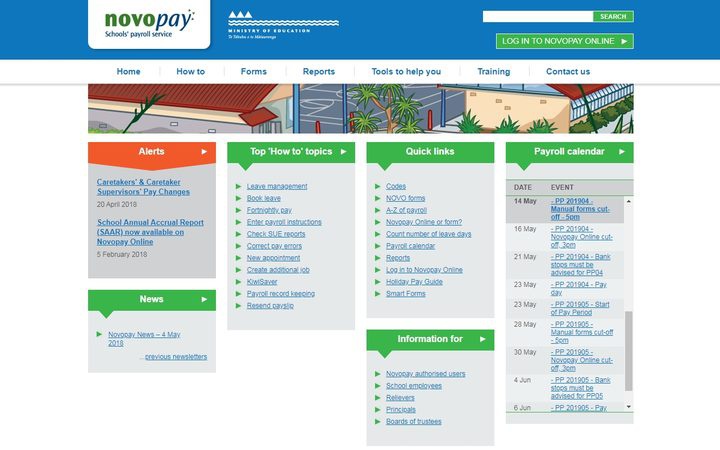
The Novopay teacher pay system. Photo: Screenshot
<p style="text-align: right;"><a href="https://www.rnz.co.nz/authors/charlie%20-dreaver" target="_blank" rel="noopener noreferrer">by Charlie Dreaver</a>, RNZ Political Reporter</p>
<h2>Both of the teachers unions &#8211; NZEI and the PPTA &#8211; have confirmed they will be taking legal action against Novopay.</h2>
<p>They have been told by Novopay the new rates and backpay for union members, which took effect from 1 July, will not be paid until 11 September.</p>
<p>Representatives from the unions have said they are talking to lawyers about their options.</p>
<p>Education Minister Chris Hipkins tweeted the delay was not good enough and said he would be following the matter up.</p>
<p>Today however, he said the delay was unavoidable.</p>
<blockquote>
<p>&#8220;I reluctantly accept that the complexity of implementing a unified pay scale and making significant changes to the agreement is going to result in a delay in implementation,&#8221; he said.</p>
</blockquote>
<p>Mr Hipkins said it was frustrating and if there was a way to speed up the process he would.</p>
<p><center><img src="http://img.scoop.co.nz/stories/images/1808/b3437177cadc8d5a8913.jpeg" alt="Chris Hipkins" width="720" height="450" border="0" /></p>
<p>Chris Hipkins said if there was a way to speed up the process, he would. Photo: RNZ / Rebekah Parsons-King</p>
<p></center></p>
<div class="article-left-box-wrapper"> </div>
<p>In the meantime, he said the replacement of Novopay was under way.</p>
<p>Since teachers heard about the delay, both unions have said they would take <a class="wpil_keyword_link" href="https://www.schoolnews.co.nz/2015/10/nzei-commences-legal-action-on-behalf-of-support-workers/" title="legal action" data-wpil-keyword-link="linked" target="_blank">legal action</a> against Novopay.</p>
<p>Primary school teachers union NZEI national secretary Paul Goulter said it was outrageous teachers had to wait so long.</p>
<blockquote>
<p>&#8220;We will move everything we can, to ensure those teachers will get what they&#8217;re entitled to when they&#8217;re entitled to it,&#8221; he said.</p>
</blockquote>
<p>National&#8217;s education spokesperson Nikki Kaye said all resources needed to be put in to getting teachers paid urgently.</p>
<p>&#8220;Some teachers are messaging me saying how is it that it only took them two pay cycles to deduct the strike action, but it&#8217;s going to take them five pay cycles to actually pay them their pay rises,&#8221; she said.</p>
<p><center><img src="http://img.scoop.co.nz/stories/images/1907/8aeea9d55c8e3fb98006.jpeg" alt="" width="720" height="480" border="0" /></p>
<p>Teachers march on Queen Street in Auckland in a bid for better pay rates. Photo: RNZ / Dan Cook</p>
<p></center></p>
<p>Ms Kaye said the government prolonged negotiations for over a year for secondary teachers, so the Ministry of Education and Education Payroll had a long time to prepare.</p>
<blockquote>
<p>&#8220;The reality is there are tens of thousands of teachers with bills to pay and mortgages that need the minister and agencies to deal with this matter urgently,&#8221; she said.</p>
</blockquote>
<p>A nationwide strike by primary, secondary and area school teachers over the pay deal that was on offer took place on 29 May, but teachers at primary and intermediate schools subsequently accepted a deal giving them an 18.5 percent pay rise over three years.</p>
<p>However, the deal was <a href="https://www.rnz.co.nz/news/national/392947/primary-school-principals-reject-government-s-latest-pay-offer" target="_blank" rel="noopener noreferrer">rejected by primary and intermediate principals</a> who said the latest offer would have seen some principals in smaller schools paid less than some teachers in larger schools.</p>

NZEI Te Riu Roa is considering legal action against the government for the disestablishment of…
NZQA is implementing AI-marking for all Year 10 written assessments from this year onwards, following…
Teaching personal financial responsibility isn't enough. Children should be taught broader economic context, argue New…
When students can't hear the teacher, they can't learn properly. Sound quality matters in education…
The Garden City is rich with learning opportunities, no matter what subject or part of…
Teaching Council of Aotearoa launch school leaders’ stories project with Unteach Racism to challenge institutional…
This website uses cookies.